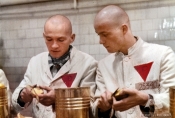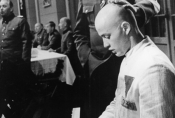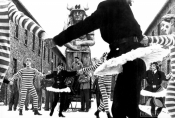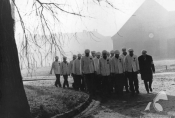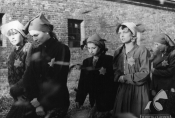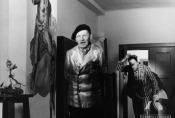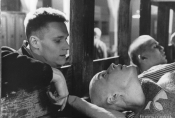KORNBLUMENBLAU [1988]
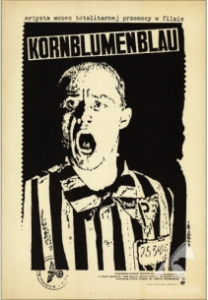
year:
- 1988
release date:
- 9 X 1989
runtime:
- 88 min
directed by:
- Leszek Wosiewicz
written by:
- Leszek Wosiewicz, Jarosław Sander based on the book by Kazimierz Tymiński “Uspokoić sen”
director of photography:
- Krzysztof Ptak
cast:
- Adam Kamień [Tadeusz Wyczyński Bławatek], Marcin Troński [Moskwa, head waiter], Piotr Skiba [Włodek], Krzysztof Kolberger [block leader Kornblumenblau], Wiesław Wójcik [block leader Wesołek], Marek Chodorowski [head of potato team], Zygmunt Bielawski [block leader of the artists], Ewa Błaszczyk [Commander’s wife], Erwin Nowiaszek [head of the political department], Jerzy Rogalski [a warden on the death block], Włodzimierz Musiał [head of the kitchen], Adrianna Biedrzyńska [a woman inmate], Ewa Harasimowicz [a writer], Andrzej Ferenc [an orderly], Jerzy Goliński [master], Leon Niemczyk [a dance leader at a Christmas party]
edited by:
- Wanda Zeman, Jarosław Wołejko
music by:
- Zdzisław Szostak
production design:
- Zenon Różewicz, Krzysztof Baumiller
produced by:
- Studio Filmowe im. Karola Irzykowskiego
executive producer:
- Jerzy Fidler
awards:
-
• the Andrzej Munk Award 1988 for Leszek Wosiewicz
• IFF Locarno (Switzerland) 1989: Bronze Leopard for Adam Kamień
• Head of the Cinematography Award in 1989 for the best director for Leszek Wosiewicz
• Lubusz Film Summer Łagów 1989 Silver Grape
•Koszalin Film Debut Festival "Youth and the Cinema" 1989: award for directorial debut
• Polish Feature Film Festival Gdynia 1989: the Gdańsk Voivod Award, the best director award for Leszek Wosiewicz, the best cinematography award for Krzysztof Ptak, best editing award for Wanda Zeman and Jaroslaw Wołejko
About the film
For the first time in history, a Polish film about the concentration camp was approached as a parable, devoid of the socio- political or psychological dimension of human suffering. The camp is, for the director, an opportunity to observe people's attitudes and behaviour, and primarily biological principles governing human actions. The film is also a critical voice in the contemporary discussion on the condition and role of the artist in society.
A young musician, Tadeusz Wyczyński, is sent to Auschwitz concentration camp for involvement in the underground resistance. He is placed on the experimental ward, where he becomes infected with typhus. He decides to survive at all costs. Kornblumenblau is the title of the German song played by the prisoner on the obsessive demand of the block leader. Thanks to that, he gets to the camp orchestra and the much-desired artists’ block, which gives him a chance of survival. After the liberation of the camp by Soviet soldiers, he gladly plays Katyusha so they can get a seat on the train.
Donata Zielińska, Leksykon polskich filmów fabularnych, Warszawa 1996
